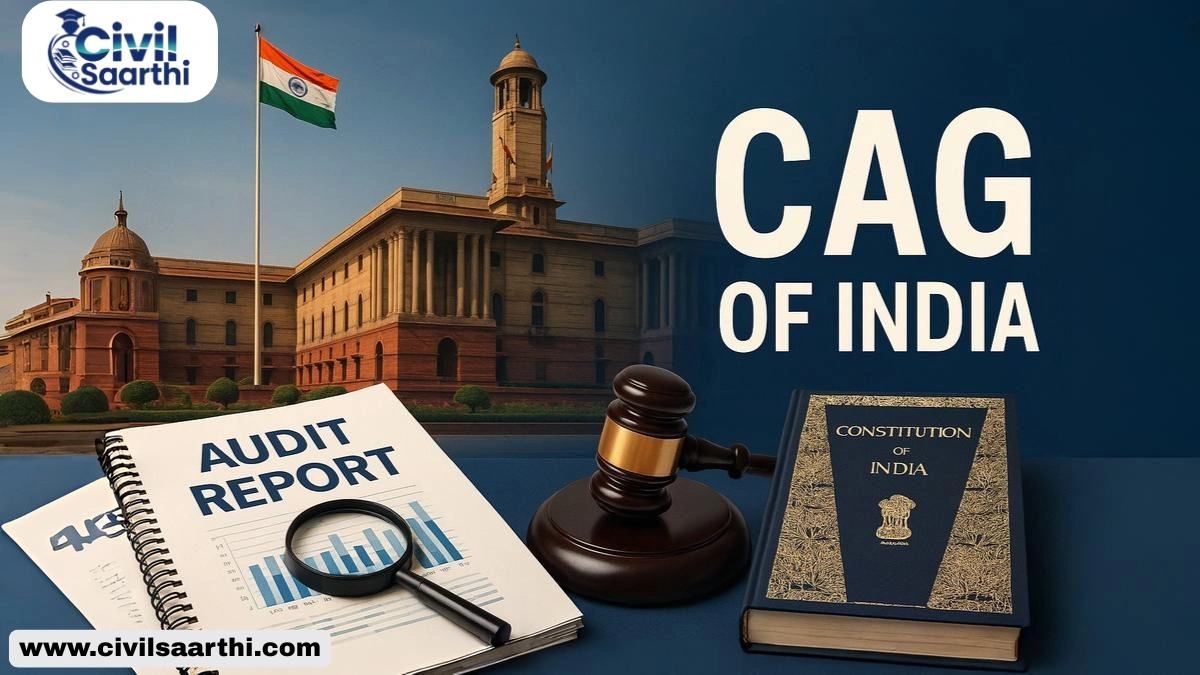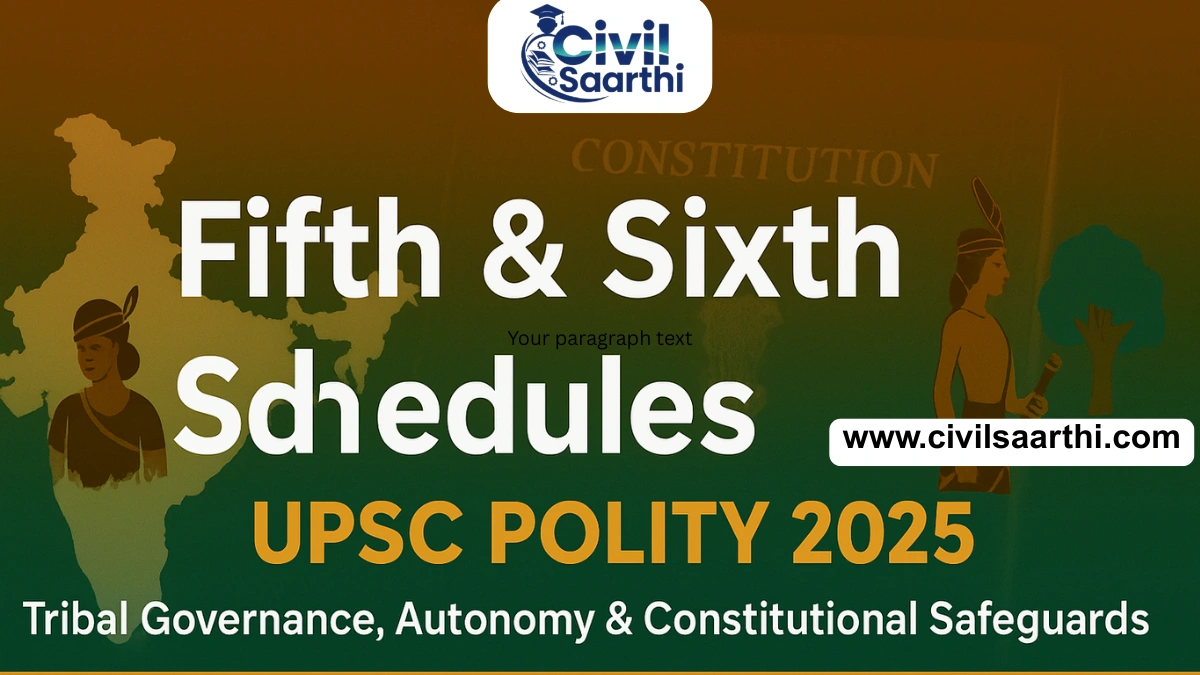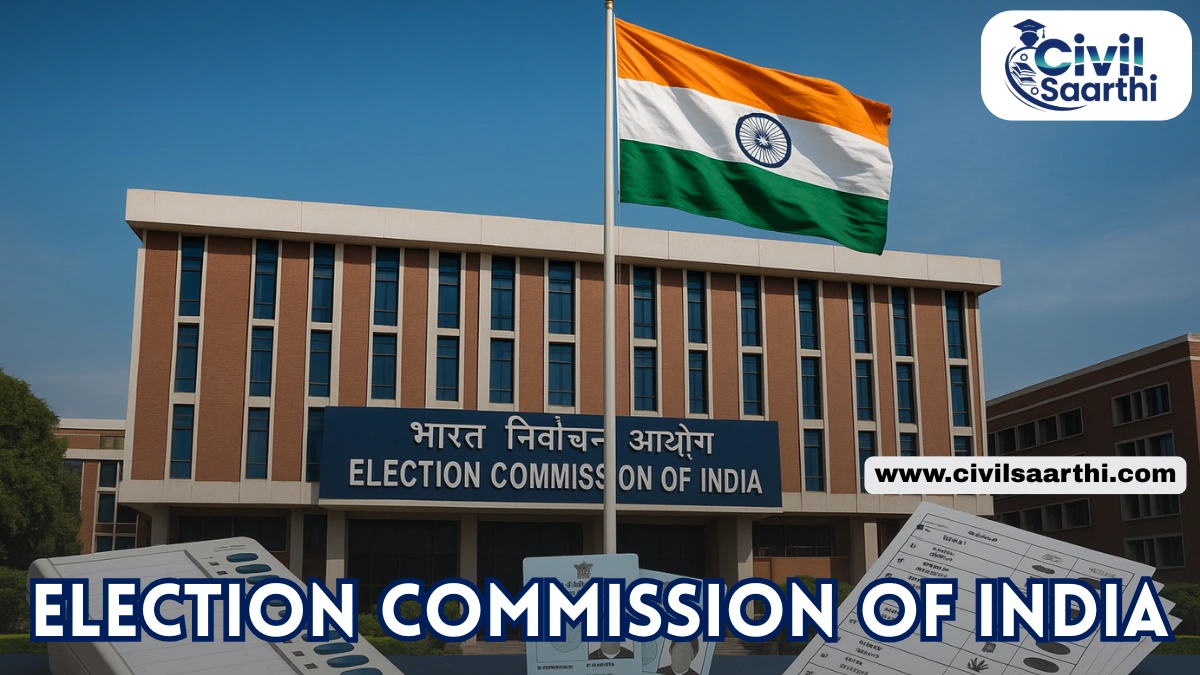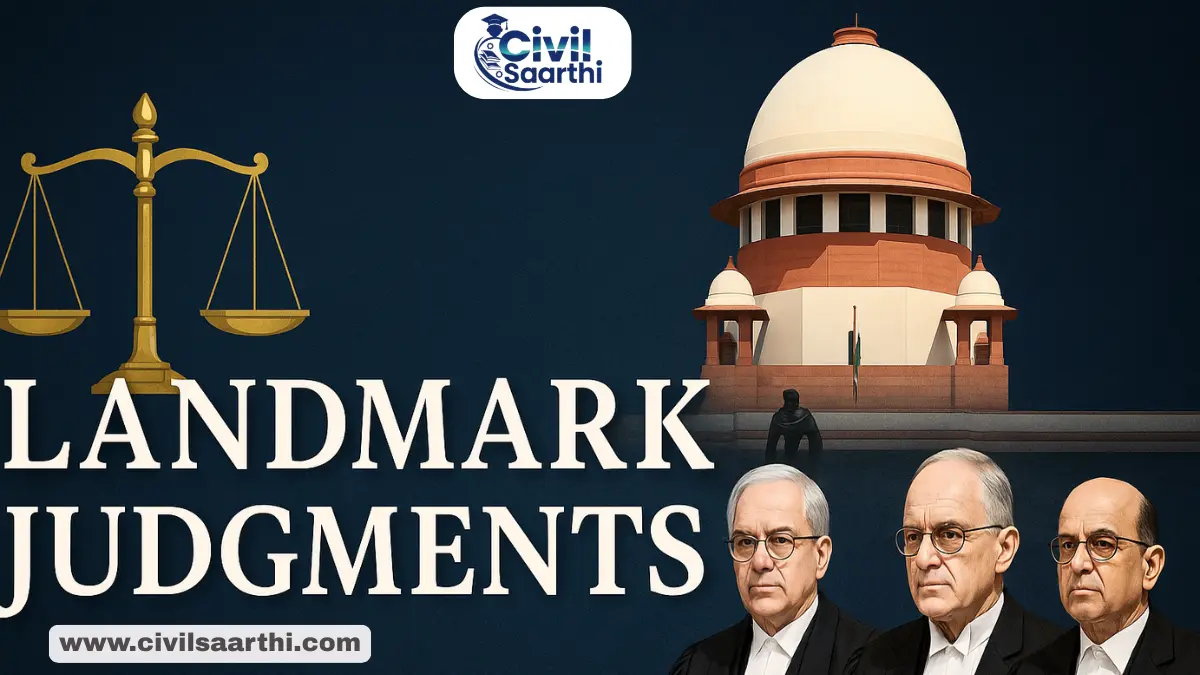The Comptroller and Auditor-General of India (CAG) is one of the most crucial constitutional authorities in the Indian democratic framework. Described by Dr. B.R. Ambedkar as the most important officer under the Constitution, the CAG acts as the guardian of the public purse and ensures that government expenditure is conducted lawfully, efficiently, and transparently.
In a parliamentary democracy, where the executive is accountable to the legislature, the CAG provides independent and objective audits of government finances, supporting legislative committees such as the Public Accounts Committee (PAC) in their oversight role.
Constitutional Provisions (Articles 148–151) Related to Comptroller and Auditor-General of India (CAG)
Article 148: Comptroller and Auditor General of India (CAG)
- Appointment: Appointed by the President of India by warrant under his hand and seal.
- Salary and Other Conditions of Service: Determined by Parliament by law.
- Further Office / Reappointment: Not eligible for further office under either the Central or State government after retirement.
- Expenditure Charged on Consolidated Fund of India (CFI): All expenses, including salaries, allowances, and pensions of the CAG and staff, are charged on the CFI.
Article 149: Duties and Powers
- Duties and powers of the CAG are determined by Parliament through law.
- CAG performs functions as prescribed in the Comptroller and Auditor General’s (Duties, Powers and Conditions of Service) Act, 1971.
Article 150: Form of Accounts
- Accounts of the Union and States shall be kept in the form prescribed by the President, on the advice of the CAG.
Article 151: Audit Reports
- Union accounts audit reports are submitted by the CAG to the President, who lays them before both Houses of Parliament.
- State accounts audit reports are submitted to the Governor, who lays them before the State Legislature.
Article 279: Certification of Net Proceeds
- CAG ascertains and certifies the net proceeds of any tax or duty.
- The certificate is final.
- “Net proceeds” means proceeds of a tax or duty minus the cost of collection.
Comptroller and Auditor General of India (Duties, Powers, and Conditions of Service) Act, 1971
- Tenure: Holds office for 6 years or until 65 years of age, whichever is earlier.
- Resignation: Can resign by writing to the President.
- Removal: Removed by the President on the same grounds and in the same manner as a Supreme Court judge.
- Condition of Service: Salary and service conditions are determined by Parliament and cannot be altered to the disadvantage of the CAG after appointment.
Duties and Powers of the CAG
The Comptroller and Auditor General of India (CAG), provided under Article 148–151 of the Constitution, is entrusted with auditing all receipts and expenditures of the Union and State governments, including those from the Consolidated Fund, Contingency Fund, and Public Account. Under Article 149 and the CAG’s (Duties, Powers and Conditions of Service) Act, 1971, the CAG examines the legality, propriety, and efficiency of financial transactions, audits government companies, statutory corporations, autonomous bodies, and local authorities substantially financed by government funds, and certifies the net proceeds of taxes and duties as per Article 279.
- Audits all expenditure from the Consolidated Fund of India, Contingency Fund of India, and Public Account of India to ensure money is spent only with legal authority and for sanctioned purposes.
- Audits all expenditure from the Consolidated Fund, Contingency Fund, and Public Account of each State to verify lawful spending and adherence to State legislative approvals.
- Examines accounts relating to taxes, duties, and other revenues of the Union and States to verify correctness of assessments, proper collection, and timely crediting to government funds.
- Certifies the net proceeds of any tax or duty as per Article 279, with the certification being final and binding.
- Conducts audits of government companies where the government holds at least 51% share capital, including subsidiary companies, under Section 139 of the Companies Act, 2013.
- Performs supplementary audits in addition to audits done by statutory auditors of government companies to ensure compliance with financial standards.
- Audits statutory corporations established under special laws of Parliament or State Legislatures, with audit methodology prescribed by the respective legislations.
- Audits bodies, authorities, local bodies, Panchayati Raj institutions, and autonomous bodies substantially financed by government grants to ensure funds are used only for sanctioned purposes.
- Audits foreign-aid projects if government funds are involved to ensure proper utilization.
- Conducts performance audits to evaluate economy, efficiency, and effectiveness of resource use and programme implementation.
- Conducts propriety audits to examine the wisdom, faithfulness, and economy of expenditure and to check wastefulness, extravagance, or private benefit.
- Advises the President and Governors on the form and structure of government accounts under Article 150.
- Provides technical guidance to accountants general and state auditors on audit and accounting matters.
- Submits audit reports relating to the Union to the President, who lays them before Parliament, and those relating to States to the Governor, who lays them before the State Legislature as per Article 151.
- Ensures audit reports are examined by the Public Accounts Committee and the Committee on Public Undertakings.
- Conducts special audits ordered by the President or Governor in cases involving suspected fraud, misappropriation, or financial irregularities.
- Audits utilization of foreign aid and special project funds where applicable.
- Has full authority to call for books, accounts, vouchers, and documents from auditees.
- Has power to inspect offices, records, and premises of audited entities.
- Can examine any government officer or employee for clarification during audit.
- Has the power to decide the scope, extent, and manner of audit independently.
Role of CAG in Public Accounts Committee (PAC)
The Comptroller and Auditor General (CAG) of India acts as the “friend, philosopher, and guide” to the Public Accounts Committee (PAC) of Parliament. The CAG provides crucial audit reports, financial insights, and expert guidance to the PAC, enabling the committee to effectively scrutinize government expenditures and hold the executive accountable for financial irregularities.
- Serves as the “friend, philosopher, and guide” to the Public Accounts Committee (PAC), providing expert advice and independent financial oversight to strengthen legislative scrutiny of public expenditure.
- Submits comprehensive audit reports highlighting appropriation of funds, misapplication of resources, and detection of financial irregularities across Union, State, and government-funded bodies.
- Provides the foundational evidence for PAC’s inquiries, enabling the committee to assess whether expenditure strictly aligns with approved purposes and legislative intent.
- Assists PAC in evaluating the legality, propriety, economy, efficiency, and effectiveness of public spending, ensuring accountability in financial administration.
- Forms the primary source for most PAC recommendations, as the committee relies heavily on the CAG’s data, findings, and expert analysis to hold the executive accountable.
Comparison: CAG of India vs CAG of Britain
The CAG of India is a constitutional authority under Articles 148-151 with jurisdiction over Union, State, and local bodies, whereas the CAG of Britain is a statutory officer under the National Audit Act, 1983, focusing mainly on central government and public bodies, reporting directly to Parliament.
| CAG of India and the CAG of Britain | ||
| Aspect | CAG of India | CAG of Britain (UK) |
| Legal Basis | Constitutional authority under Articles 148–151 of the Indian Constitution. | Statutory authority under the National Audit Act, 1983. |
| Appointment | Appointed by the President of India. | Appointed by the Monarch on the recommendation of the Prime Minister, with House of Commons approval. |
| Tenure | 6 years or until 65 years of age, whichever is earlier. | No fixed term; serves until retirement (currently 65 years). |
| Independence | Removal process similar to a Supreme Court judge; salary not subject to Parliament’s vote. | Independent of government departments; removable only by both Houses of Parliament. |
| Scope of Audit | Union, States, Union Territories, government companies, statutory corporations, and local bodies substantially funded by the government. | Central government departments, non-departmental public bodies, and certain public corporations. |
| Advisory Role | Advises on form of government accounts under Article 150. | Advises Parliament’s Public Accounts Committee on government spending efficiency. |
| Reporting Mechanism | Reports submitted to President/Governors, who place them before Parliament/State Legislatures. | Reports submitted directly to Parliament via the Public Accounts Committee. |
Issues and Challenges of the CAG in India
- Limited Enforcement Powers: Can only audit and report; lacks authority to enforce corrective action on audit findings.
- Executive Delays in Tabling Reports: Audit reports are sometimes presented late in legislatures, reducing their relevance for timely action.
- Political and Bureaucratic Resistance: Departments may resist audits or withhold full access to records, affecting audit quality.
- Scope Limitations: Certain bodies, especially PPP projects and private contractors handling public funds, are outside mandatory audit scope.
- Public Awareness Gap: Low citizen engagement and awareness of CAG findings weakens public pressure for accountability.
- Capacity Constraints: Shortage of skilled auditors and modern forensic audit tools hampers in-depth investigation.
- Overlapping Jurisdictions: Coordination issues with other oversight agencies like CVC, CBI, and State Auditors.
- Performance Audit Challenges: Difficulty in measuring qualitative aspects like efficiency and effectiveness beyond financial compliance.
Reforms Needed for Strengthening the CAG in India
- Grant limited enforcement powers to ensure binding follow-up on audit recommendations.
- Expand audit scope to cover PPP projects, private contractors using public funds, and CSR spending of PSUs.
- Mandate timely tabling of CAG reports in legislatures to maintain audit relevance.
- Strengthen technological and manpower capacity with advanced audit tools and skilled professionals.
- Increase public awareness of audit findings through simplified reports and wider dissemination.
Committee Suggestions for Strengthening the CAG in India:
- Shunglu Committee (2012): Recommended expanding CAG’s audit jurisdiction to cover PPP projects, private entities using significant public funds, and regulatory bodies.
- PAC Recommendations: Suggested timely presentation of CAG reports in legislatures and stronger follow-up mechanisms for implementation.
- 2nd Administrative Reforms Commission (ARC): Advocated for enhanced performance audits, real-time auditing systems, and modern audit techniques.
- V.K. Shunglu Task Force on PPP Audit: Proposed a clear legal framework to allow CAG to audit private sector entities involved in public infrastructure projects.
- Estimates Committee (2016): Urged better inter-agency coordination, capacity building, and recruitment of domain experts in areas like IT and project management.
UPSC Prelims practice MCQs on the CAG of India
- Consider the following statements about the Comptroller and Auditor General (CAG) of India:
- The CAG is appointed by the President of India.
- The CAG can be removed by the President on the recommendation of the Council of Ministers.
- The CAG’s salary and allowances are charged upon the Consolidated Fund of India.
Which of the statements given above is/are correct?
(a) 1 and 2 only
(b) 2 and 3 only
(c) 1 and 3 only
(d) 1, 2 and 3
Answer: (c)
Explanation: The CAG is appointed by the President (Art. 148) but can be removed in the same manner as a Supreme Court judge (not by the Council of Ministers). His salary is charged upon the Consolidated Fund of India.
- Which Article of the Indian Constitution deals with the form in which the accounts of the Union and States shall be kept?
(a) Article 148
(b) Article 149
(c) Article 150
(d) Article 151
Answer: (c)
Explanation: Article 150 provides that the accounts of the Union and States shall be kept in the form prescribed by the President on the advice of the CAG.
- With reference to the duties of the CAG, which of the following is/are correct?
- To audit all receipts and expenditure of the Union and the States.
- To audit the accounts of any body or authority substantially financed from Union or State revenues.
- To act as the Chairman of the Finance Commission.
Select the correct answer using the code given below:
(a) 1 only
(b) 1 and 2 only
(c) 2 and 3 only
(d) 1, 2 and 3
Answer: (b)
Explanation: The CAG audits receipts, expenditure, and accounts of bodies substantially funded by government, but has no role in chairing the Finance Commission.
- In the context of the CAG’s reports, consider the following:
- CAG submits reports relating to the Union to the President, who lays them before Parliament.
- CAG submits reports relating to States directly to the State Legislature.
Which of the statements given above is/are correct?
- (a) 1 only
- (b) 2 only
- (c) Both 1 and 2
- (d) Neither 1 nor 2
Answer: (a)
Explanation: For States, the CAG submits reports to the Governor, who lays them before the State Legislature.
- In Britain, the CAG functions as the head of which institution?
- (a) Public Accounts Committee
- (b) National Audit Office
- (c) Treasury Department
- (d) Parliamentary Audit Board
Answer: (b)
Explanation: The CAG of Britain heads the National Audit Office (NAO) and reports to Parliament.
FAQs on Comptroller and Auditor General of India (CAG)
Q1. Who appoints the Comptroller and Auditor General of India?
The CAG is appointed by the President of India under Article 148 of the Constitution.
Q2. What is the term of office of the CAG?
The CAG holds office for six years or until the age of 65 years, whichever is earlier.
Q3. How can the CAG be removed from office?
The CAG can be removed only in the same manner and on the same grounds as a judge of the Supreme Court, i.e., by Parliament through an address supported by a special majority, on grounds of proved misbehaviour or incapacity.
Q4. Are the CAG’s reports binding on the government?
No, the CAG’s reports are not binding, but they are highly influential. They are examined by Parliamentary Committees like the Public Accounts Committee (PAC), and recommendations are made for corrective action.
Q5. Does the CAG audit private companies?
The CAG does not audit all private companies, but it can audit those substantially financed by government funds, involved in Public-Private Partnerships (PPPs), or holding government equity, as per statutory provisions.
Q6. What is the constitutional status of the CAG?
The CAG is a constitutional authority mentioned under Articles 148 to 151 of the Indian Constitution.
Q7. Which funds does the CAG audit?
The CAG audits the Consolidated Fund, Contingency Fund, and Public Account of both the Union and the States.







